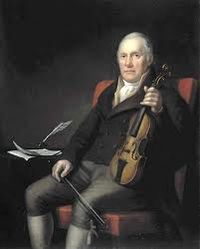Annotation:Miss Gordon—Liverpool: Difference between revisions
(Created page with "'''Back to [[{{BASEPAGENAME}}]]''' ---- <p><font face="garamond, serif" size="4"> '''MISS GORDON--LIVERPOOL.''' Scottish, Slip Jig. F Major. Standard tuning (fiddle). AAB. Com...") |
No edit summary |
||
| Line 3: | Line 3: | ||
<p><font face="garamond, serif" size="4"> | <p><font face="garamond, serif" size="4"> | ||
'''MISS GORDON--LIVERPOOL.''' Scottish, Slip Jig. F Major. Standard tuning (fiddle). AAB. Composed by William Marshall (1748-1833). Moyra Cowie, in her book '''The Life and Times of William Marshall''' (1999), finds the Marshall connection with this Liverpool family through Marshall’s brother Henry, who worked at the Custom House. Harry Gordon of the Laggan Gordon branch of the family owned the Tobacco Warehouse in Liverpool, and presumably the title refers to a daughter. | '''MISS GORDON--LIVERPOOL.''' Scottish, Slip Jig. F Major. Standard tuning (fiddle). AAB. Composed by William Marshall (1748-1833). Moyra Cowie, in her book '''The Life and Times of William Marshall''' (1999), finds the Marshall connection with this Liverpool family through Marshall’s brother Henry, who worked at the Custom House. Harry Gordon of the Laggan Gordon branch of the family owned the Tobacco Warehouse in Liverpool, and presumably the title refers to a daughter. | ||
[[File:marshall.jpg|200px|thumb|left|William Marshall]] | |||
<br> | <br> | ||
<br> | <br> | ||
Revision as of 22:44, 20 January 2013
Back to Miss Gordon—Liverpool
MISS GORDON--LIVERPOOL. Scottish, Slip Jig. F Major. Standard tuning (fiddle). AAB. Composed by William Marshall (1748-1833). Moyra Cowie, in her book The Life and Times of William Marshall (1999), finds the Marshall connection with this Liverpool family through Marshall’s brother Henry, who worked at the Custom House. Harry Gordon of the Laggan Gordon branch of the family owned the Tobacco Warehouse in Liverpool, and presumably the title refers to a daughter.

Source for notated version:
Printed sources: Marshall, Fiddlecase Edition, 1978; 1845 Collection, p. 10.
Recorded sources:
Back to Miss Gordon—Liverpool
